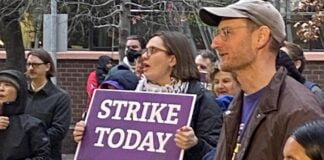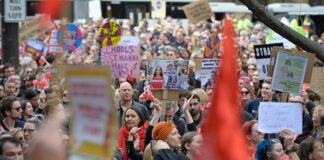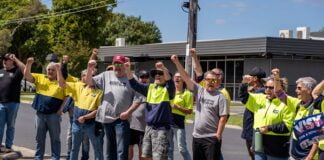Deakin Uni gears up for strike action
Strike action looks likely at Deakin Uni in Melbourne, with the NTEU voting for action if there is no movement from management by end of March. Negotiations have been underway since October but management has refused to offer a pay increase.
But NTEU Victorian Secretary Colin Long said, “By its own admissions, Deakin University is the most profitable in Victoria. Last financial year, it boasted a $60 million surplus, $22 million greater than budgeted, which the Vice-Chancellor attributed to ‘underspends’ on salaries, research, buildings and grounds costs.”
The NTEU is also pushing for enforceable caps on teaching and administration hours to combat the huge amount of unpaid overtime staff are pressured to perform. In a familiar, refrain, the university is opposing this citing its need for “flexibility”.
WA nurses force Barnett back down
Nurses in WA have won a 14.7 per cent pay rise over three years without losing any conditions, after they forced Premier Colin Barnett into an embarrassing back down on the eve of the state election.

Industrial action saw one in five beds closed and elective surgeries cancelled. Nurses say cutbacks in hospital staff have seen them taking on work previously done by cleaners and orderlies, such as cleaning toilets and bathrooms, and taking out rubbish. Parking fees at public hospitals have also gone up 700 per cent.
When the union threatened a 24-hour strike during the election campaign, Barnett caved. The nurses’ victory has been welcomed by other public sector unions in WA as they face their own pay claims and fight against job cuts.
Airport security staff fight for fair pay
Two hundred security screening staff at Qantas and Jetstar terminals at Melbourne airport are threatening to strike over Easter in support of a five per cent wage claim. The workers earn up to 27 per cent less than other screeners doing the same job at the airport under different employers, according to their union, United Voice.
“Being an aviation screener is one of the toughest and most stressful jobs in the industry and one of the most demanding in any airport, and for good reason—these are the people who stand between disaster and anyone who flies”, Jess Walsh, the union’s state secretary said. The workers are required to undertake constant training and performance testing in order to maintain standards required for airport safety.
Four months of negotiations with their employer, MSS Security, has delivered nothing, leaving the workers with no option but to resort to industrial action.
Although the airlines have claimed their operations would be unaffected by any strike action, industrial bans involving “work to rule” implemented in March caused major passenger delays.
Forty-eight hour rail strike costs coal companies millions
Rail workers at Pacific National’s coal division have yet to reach agreement with the company following a 48-hour strike in mid-February. The 800 workers, including train drivers and terminal operators, cost mining companies $50 million through their two-day strike.
The company’s Coal Director David Irwin admitted, “the 600,000 tonnes of delivered coal lost as a result of this action cannot be recovered in the future.
“NSW Coal Chains operate at maximum capacity every day of the week, meaning these losses are real.”
Coal mining company Whitehaven had threatened to launch its own court action against the strike, but did not go ahead.
The company has tried to push a non-union agreement on its workforce, which was rejected by 85 per cent of its workers in December, and has effectively refused to bargain with the union.
The workers are asking for a 7 per cent pay rise a year, to bring them up to the pay rates of other companies in the industry. Given the multi-billion dollar profits of the coal companies, and 43 per cent increase in profit last year of Pacific National’s parent company Asciano, it’s not an unreasonable demand.
But the company thumbed its nose at its workforce by telling them its offer of a 4 per cent pay rise would be cut to 3 per cent if they did not agree by January 31, and to 2.5 per cent if they did not agree by the end of February and went ahead with the strike.
Bob Nanva, national secretary of the Rail Tram and Bus Union, which represents the workers, said, “This is a company that would rather flush money down the toilet than give their workforce a fair wage and fair conditions.
“This dispute will cost them more than the wage rise we’re asking for.”
Pacific National is the country’s largest private rail firm. The union is also balloting for industrial action against Pacific National’s bulk division, which transports coal, grain and industrial products in NSW and Victoria, with strikes up to two weeks long possible.





